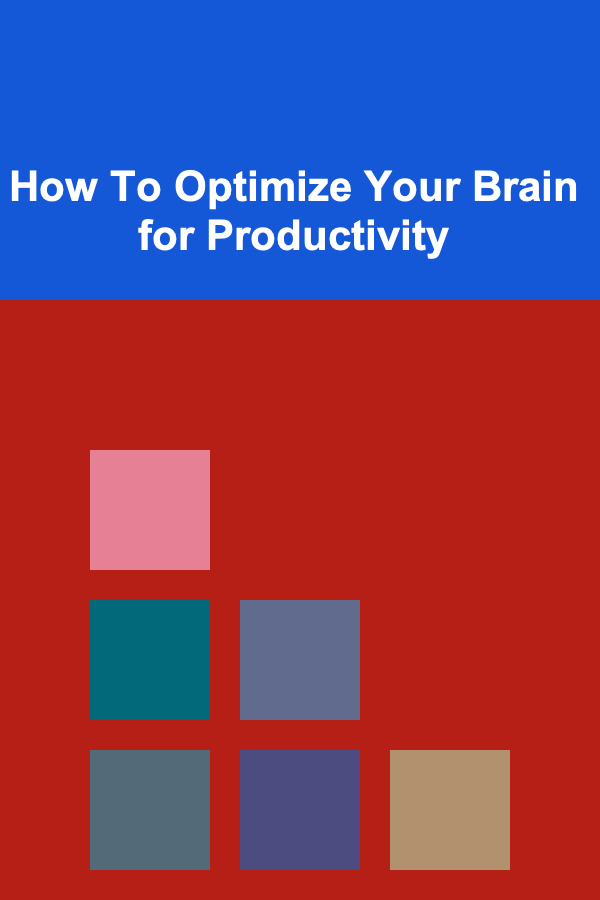
How To Optimize Your Brain for Productivity
ebook include PDF & Audio bundle (Micro Guide)
$12.99$10.99
Limited Time Offer! Order within the next:

In today's fast-paced world, optimizing your brain for productivity is more important than ever. We are constantly bombarded with distractions, multi-tasking demands, and mental fatigue, all of which can negatively impact our ability to focus and perform at our best. Thankfully, by understanding how our brains work and applying strategies to enhance cognitive function, we can boost our productivity, improve mental clarity, and achieve more in less time.
This article explores practical techniques to optimize brain function and maximize productivity, diving into neuroscience, lifestyle changes, and mental strategies that can have a profound impact on your daily performance.
The Science of Productivity: Understanding Your Brain
Before jumping into practical strategies, it's crucial to understand how your brain works in relation to productivity. The human brain is an incredibly powerful organ, capable of processing an enormous amount of information every second. However, its capacity is limited, and just like any other muscle in your body, it can become fatigued and inefficient when overworked.
The Prefrontal Cortex and Productivity
The prefrontal cortex (PFC) is the part of your brain responsible for decision-making, problem-solving, and goal-setting. It governs attention, working memory, and cognitive flexibility---skills that are critical for productive work. When the prefrontal cortex is overloaded with too much information or stress, it can become less effective, leading to decreased focus, slower decision-making, and cognitive fatigue.
Understanding the role of the prefrontal cortex is vital because many strategies to optimize your brain for productivity aim to support and improve the functioning of this part of the brain. Strategies such as stress management, sleep optimization, and the use of cognitive techniques can all help in keeping the prefrontal cortex sharp and focused.
Dopamine and Motivation
Another important factor in productivity is dopamine, the neurotransmitter often associated with pleasure and reward. Dopamine plays a crucial role in motivation and goal-directed behavior. When you accomplish a task or reach a goal, your brain releases dopamine, which reinforces the behavior and motivates you to repeat it.
However, it's important to understand that constant dopamine spikes---such as those from social media notifications or sugar---can lead to a form of "dopamine burnout." This can result in decreased motivation and difficulty concentrating. Therefore, optimizing dopamine levels involves balancing rewarding activities, avoiding overstimulation, and aligning your efforts with long-term goals.
Cognitive Load and Multitasking
Cognitive load refers to the mental effort required to process information. High cognitive load can impair memory and reduce the brain's ability to focus, leading to mistakes and decreased efficiency. Multitasking, while often seen as a desirable skill, can increase cognitive load and slow down productivity. Studies show that switching between tasks requires the brain to constantly adjust, which consumes valuable mental energy and ultimately lowers efficiency.
Understanding how cognitive load affects your brain allows you to design your workday in a way that minimizes distractions and reduces mental fatigue. Focusing on one task at a time is often the most effective approach for maintaining productivity.
Key Strategies to Optimize Your Brain for Productivity
Now that we have a foundational understanding of how the brain operates in relation to productivity, let's explore actionable strategies to optimize your cognitive function. These strategies draw on neuroscience, psychology, and behavioral science to enhance focus, motivation, and overall performance.
1. Prioritize Sleep for Cognitive Restoration
Sleep is perhaps the most important factor when it comes to optimizing brain function. During sleep, the brain consolidates memories, repairs neural connections, and clears waste products that accumulate during the day. Chronic sleep deprivation can impair decision-making, creativity, and cognitive flexibility, making it difficult to stay productive.
Tips for Better Sleep:
- Maintain a Regular Sleep Schedule: Go to bed and wake up at the same time every day to regulate your circadian rhythm.
- Create a Sleep-Friendly Environment: Keep your bedroom cool, dark, and quiet to promote restful sleep.
- Avoid Stimulants: Limit caffeine and nicotine intake, especially in the hours leading up to bedtime.
By ensuring you get sufficient, high-quality sleep, you provide your brain with the rest it needs to function at its highest level.
2. Nutrition for Cognitive Function
The brain requires proper fuel to operate efficiently. A well-balanced diet rich in nutrients, vitamins, and minerals can support cognitive function and improve productivity. Foods rich in omega-3 fatty acids, antioxidants, and complex carbohydrates have been shown to enhance memory, focus, and mental clarity.
Brain-Boosting Foods:
- Fatty Fish: Rich in omega-3s, fatty fish like salmon and mackerel promote brain health and improve cognitive function.
- Blueberries: Packed with antioxidants, blueberries help protect the brain from oxidative stress and improve memory.
- Nuts and Seeds: Rich in healthy fats, vitamins, and minerals, nuts and seeds support brain function and promote focus.
- Leafy Greens: Vegetables like spinach and kale provide essential nutrients that help reduce brain inflammation and promote mental clarity.
By focusing on a nutrient-dense diet, you can optimize your brain's ability to function at its best.
3. Exercise to Boost Brain Power
Physical exercise is another critical factor in brain optimization. Regular exercise promotes the growth of new neurons, improves blood flow to the brain, and increases the release of neurotransmitters such as dopamine and serotonin, which are crucial for motivation and mood regulation.
Benefits of Exercise for Productivity:
- Increased Focus: Regular physical activity can help sharpen focus and improve cognitive function.
- Reduced Stress: Exercise reduces levels of cortisol, the hormone associated with stress, leading to improved mood and mental clarity.
- Enhanced Memory: Cardiovascular exercise, in particular, promotes neurogenesis, the creation of new neurons, which can enhance memory and learning.
Incorporating even moderate physical activity into your daily routine, such as walking, swimming, or yoga, can have a profound impact on brain function and productivity.
4. Practice Mindfulness and Meditation
Mindfulness and meditation practices have gained significant attention for their ability to improve focus, reduce stress, and optimize brain function. These practices promote neuroplasticity, the brain's ability to reorganize itself and form new neural connections. By practicing mindfulness, you can improve your ability to concentrate and reduce mental clutter, which is essential for productivity.
How to Get Started with Mindfulness:
- Breathing Exercises: Spend a few minutes each day focusing on your breath to calm the mind and reduce stress.
- Mindful Walking: Take short walks while focusing on your surroundings and the sensations in your body.
- Meditation Apps: Use guided meditation apps such as Headspace or Calm to build a regular mindfulness practice.
By incorporating mindfulness into your routine, you can reduce mental distractions and enhance your ability to focus on tasks.
5. Time Management and Task Prioritization
Effective time management is essential for productivity, but it's not just about working harder; it's about working smarter. One of the most effective ways to manage your time is through task prioritization. The Eisenhower Matrix, for example, helps you categorize tasks based on urgency and importance, allowing you to focus on what truly matters.
Time Management Tips:
- Use the Pomodoro Technique: Work in focused intervals, such as 25 minutes of work followed by a 5-minute break. This helps maintain focus and prevents burnout.
- Batch Similar Tasks: Group similar tasks together to reduce the cognitive load of switching between different types of work.
- Set Clear Goals: Break down larger projects into smaller, manageable tasks with specific deadlines to maintain momentum.
By managing your time effectively and focusing on the most important tasks, you can maximize productivity and avoid feeling overwhelmed.
6. Cognitive Training and Brain Exercises
Just as physical exercise strengthens muscles, cognitive training can enhance brain function. Regular mental exercises, such as puzzles, strategy games, and memory challenges, can improve memory, problem-solving, and cognitive flexibility.
Cognitive Training Tips:
- Brain Games: Apps like Lumosity or Elevate offer games designed to improve cognitive skills such as attention, memory, and reasoning.
- Learn Something New: Constantly challenging your brain by learning new skills or hobbies can enhance neuroplasticity and improve overall cognitive function.
- Practice Deep Work: Engage in deep, uninterrupted work to build concentration and increase mental endurance.
By consistently engaging in cognitive training, you can improve your brain's ability to handle complex tasks and boost your productivity.
7. Stress Management for Optimal Brain Function
Chronic stress can have a devastating impact on brain function. It can impair memory, reduce cognitive flexibility, and diminish focus. Therefore, managing stress is crucial for maintaining productivity. Practices like deep breathing, progressive muscle relaxation, and yoga can help lower stress levels and optimize brain function.
Stress Management Techniques:
- Breathing Exercises: Slow, deep breaths can help calm the nervous system and reduce stress.
- Progressive Muscle Relaxation: Tense and relax different muscle groups to relieve physical tension.
- Yoga or Tai Chi: These practices combine physical movement with breath control to reduce stress and enhance mental clarity.
By effectively managing stress, you can create a calm and focused mental state conducive to productivity.
Conclusion
Optimizing your brain for productivity involves a holistic approach that encompasses lifestyle changes, mental strategies, and physical health. By prioritizing sleep, nutrition, exercise, and mindfulness, you can support your brain's cognitive function and improve your ability to focus, think creatively, and perform at your best.
Implementing these strategies may take time, but the rewards in terms of productivity, well-being, and overall quality of life are well worth the effort. By adopting a proactive approach to brain optimization, you can unlock your full potential and achieve greater success in all areas of life.
Remember, productivity is not about doing more---it's about doing the right things in the most effective way possible. With the right strategies in place, you can optimize your brain, increase your productivity, and achieve your goals with greater ease and efficiency.

How to Implement Psychological Pricing Techniques for Better Sales
Read More
How To Make Coffee-Based Sauces and Glazes
Read More
How to Use Weatherstripping for Better Soundproofing
Read More
Understanding Quantum Machine Learning
Read More
Choosing the Right Fonts for Your Projects: A Comprehensive Guide
Read More
How to Choose the Right Beach Vacation Destination for Your Personality
Read MoreOther Products

How to Implement Psychological Pricing Techniques for Better Sales
Read More
How To Make Coffee-Based Sauces and Glazes
Read More
How to Use Weatherstripping for Better Soundproofing
Read More
Understanding Quantum Machine Learning
Read More
Choosing the Right Fonts for Your Projects: A Comprehensive Guide
Read More